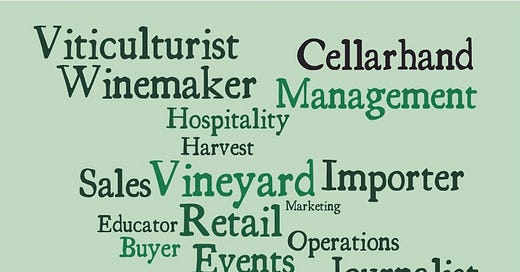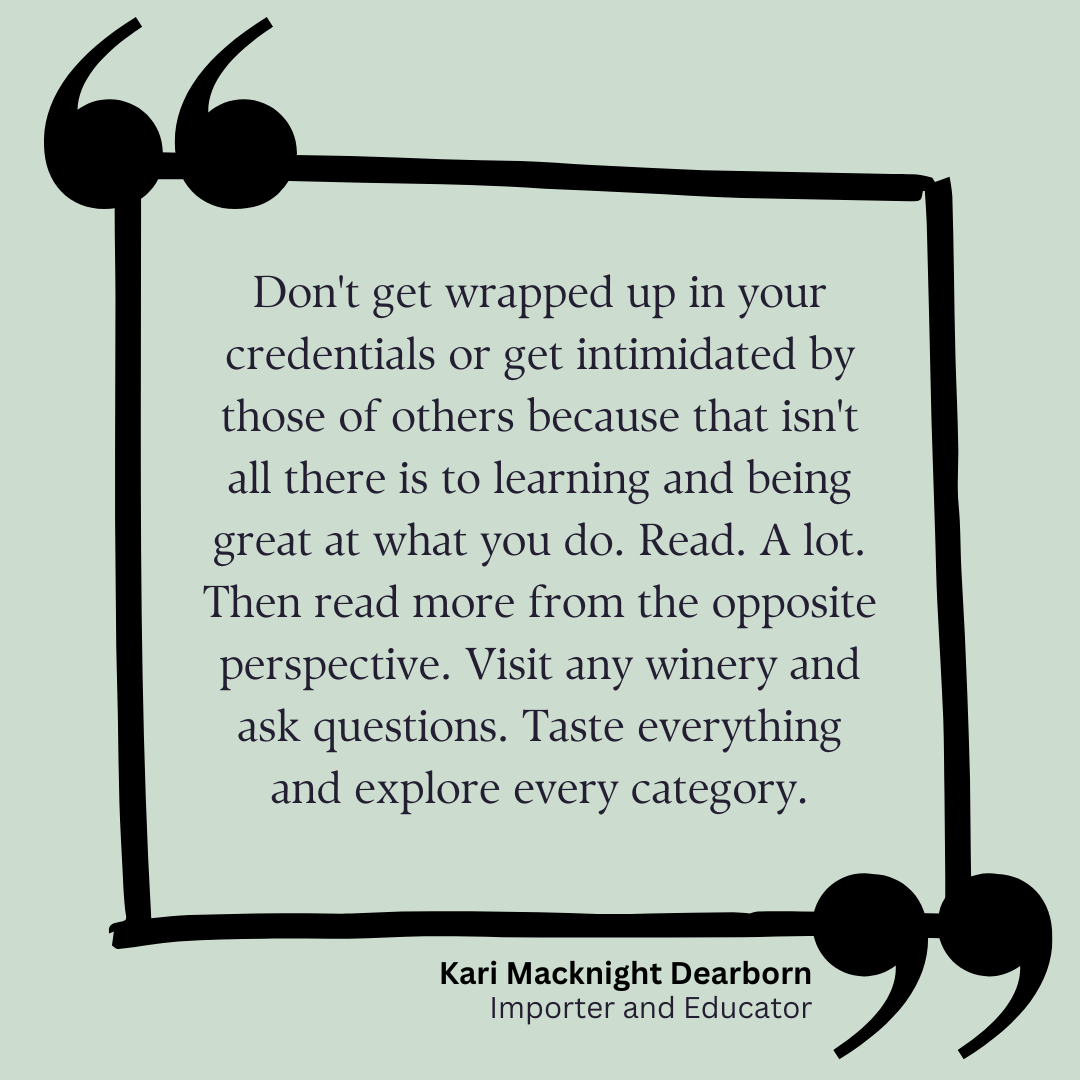While there are many different roles in the wine industry, the Wine & Spirit Education Trust (WSET), which provides wine education and qualifications, categorizes some of the positions as follows: commercial (sourcing, buying, selling, marketing), service (selling and serving in a hospitality environment), and production (viticulturist, vineyard manager, winemaker). I would also add education, writing, and events to the list. To get a small cross-section of experiences about some of the roles, I chatted with a few people in the Ontario wine industry: an importer and educator (Kari Macknight Dearborn), a writer and sommelier (Kate Dingwall), and a wine bar owner and winemaker (David Everitt). Excerpts from our conversation about their careers and the wine industry follow (edited for length and clarity).
What is your current role and education?
Kari Macknight Dearborn: I have three roles that relate to wine: founder of Drink Better Wines + Spirits, a small agency that imports and distributes wines and spirits; I teach at George Brown; and I am a research assistant in a study relating to aroma. I went to journalism school and also studied printing technology. I studied wine mostly on my own until I enrolled in my first WSET course and worked my way through the levels, but put my studies on hold during the pandemic to focus on my business. I will write my final diploma exam in May. I have also studied with Bruce Wallner at the Sommelier Factory.
Kate Dingwall: I'm a freelance writer and sommelier. Right now, I write consistently for Forbes, Wine Enthusiast, The Toronto Star, Food & Wine, MAXIM, and Toronto Life. I also pour wine at Dreyfus once a week! I have a Masters of Brand Direction in fine wines and I did my WSET II; I am on the fence of doing my third level — I’m sure I'd learn something but most of my knowledge has come from tastings, conversations, and work trips to wine regions.
David Everitt: I am co-owner and winemaker at Paradise Grapevine/Paradise Grapevine Winery. I took Environmental Engineering but never practiced it, deciding instead to pursue a career in brewing beer. After four years in the brewing industry I moved into winemaking. Some skills transcended both jobs but most of my learning has been done on the job, reading educational materials, and also with the help of talented friends who helped me in the early days. I thought about winemaking school but decided against it as I firmly believe that university teaches you how to learn just as much as it teaches you specific skills.
How did you get your start in wine?
Kari: As an exchange student I lived in Hungary and was introduced to the world of wine. Years later, while in the advertising business, I got to work on several large beverage alcohol brands — that experience got me interested in learning everything I could about how things were made and marketed. During my early WSET levels I became acquainted with agents and winemakers who helped me realize I could marry my interests, values and education into a new career selling the kinds of wines I wanted to drink, and I started Drink Better in January 2019.
Kate: I fell into it the way most people do — accidentally. I started working as a server/bartender and along the way I was learning more and more about wine. I've always been a history geek and I realized there's a gold mine of cool stories and traditions associated with wine and spirits. I was working as a fashion editor at a magazine and then as my wine knowledge grew, those two worlds overlapped and I slowly stopped writing about fashion and more about wine and spirits. Eight years later, here I am.
Dave: Christian [Dave’s business partner at PG] and I decided to buy 8 tonnes of grapes in 2019, not exactly on a whim, but definitely without much of a plan. At that point I had just left my brewing job at Burdock and I had 2-3 months to learn my ass off before the grapes arrived. I didn't really 'get a start' in wine, Christian and I just kind of jumped in head first.
What changes are you seeing in the wine industry since you started?
Kari: Easier to ask what hasn't changed! We have miles to go, but I am seeing some positive changes around whose voices we are hearing more (and less) of. I'd like to see that arc continue so that this business becomes a truly safe, welcoming and financially sustaining one for anyone who wants to be in it. I'm seeing less interesting product on the shelves at LCBO with every passing year and more incredible stuff in bottle shops, and there are also so many great new wine clubs consumers can join. There is so much choice out there and I am here for it.
Kate: I'm hesitant to say there's less pretension in the industry, but it's definitely a far more approachable field. Likely because of the breadth of ways there are to interact and learn about wine. Ten, fifteen years ago the only path upwards in wine was via certifications or moving your way up in restaurants. Now, you can listen to podcasts, do fun seminars at bars, go to tasting events like Raw — there are endless ways to build your knowledge beyond investing in certification courses. Wine also feels decidedly less stuffy. I've seen a lot of younger somms and wine directors put a large focus on more left-field wine regions. And concepts like skin-contact wines and chilled reds are also easier entryways into the world of wine.
Dave: The industry is significantly larger than it was when we started five years ago. Back then there was only a handful of bars with natural wine in Toronto, now it's ubiquitous which is cool. There are also many more wine agents which is great for product diversity. It means you have to really adapt and be in the loop to stay relevant. There's been a pandemic between when we started and now, and that's also changed the game, allowing for this 'kind-of' retail model which I think has given curious people much easier access to natural wines.
What advice do you have for someone interested in working in the wine industry?
Kari: Don't get wrapped up in your credentials or get intimidated by those of others because that isn't all there is to learning and being great at what you do. Read. A lot. Then read more from the opposite perspective. Visit any winery and ask questions. Taste everything and explore every category, and decide for yourself what's worth supporting. And insist on being paid what you are worth. Paying your dues and being exploited are not the same thing.
Kate: Start region by region. Find one that appeals to you and learn everything you can about it. Try everything you can from that region, look at maps, understand what makes it special. Try everything! Talk to people! One of the best parts of wine is it's a collaborative experience, so learning from your peers is a wonderful way to expand your knowledge. It's a small industry and very much one rooted in community. I love snuggling up to the bar at my favorite wine bar (Loop Line!) and trying whatever they've opened.
Dave: Make friends with people in the industry and email your ass off. Show face at wine bars if you can, although that can be an expensive habit so I understand it's not super easy to do that. And go work at wineries! The best way to learn is to be on the ground sorting grapes with fellow curious minds. We hire temp staff during harvest, or otherwise it's a great way to travel.
Thank you Kari, Kate, and Dave for taking the time to share your experiences in the wine industry. And thank you to a newsletter reader (who also has an informative newsletter about economics) for asking about careers in wine and inspiring this issue!







Thanks for doing this one!